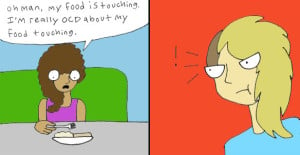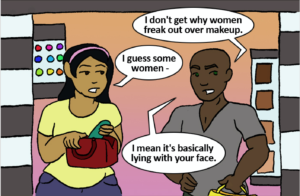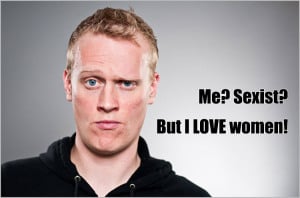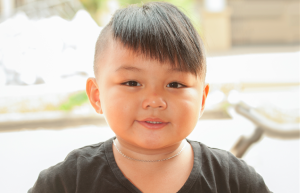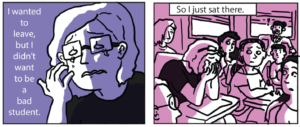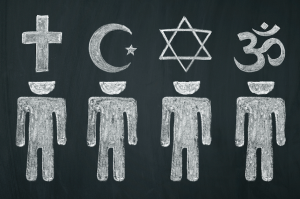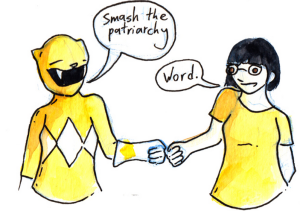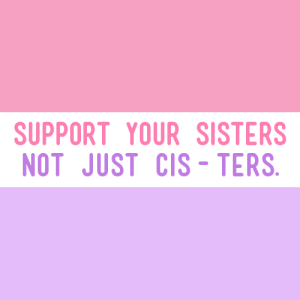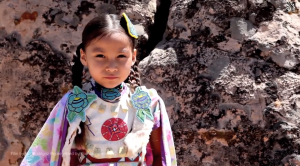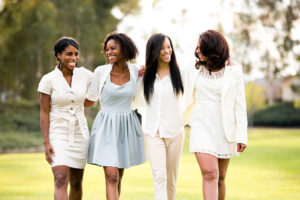
Four people walk together outdoors, with their arms around each others’ backs.
When I was eighteen, shortly before my mom would disown me, she had a parish priest come by to bless her house – a kind of Catholic supplement to the feng shui she had already paid for.
She was married to a man named Thad* at the time, whom she had introduced to me when I was eleven. An atheist, Thad was home that day to smile politely through the priest’s ritual.
As post-blessing small talk, the priest asked my mom and Thad how long they had been together. One of them answered, “Nineteen years.”
Surprise: This isn’t a story. It’s a math problem.
I was eighteen at the time. My mom and dad separated when I was six, meaning she and Thad had been together through seven years of my parents’ marriage. I had suspected some overlap, but hadn’t known for sure.
Of my three younger siblings, two were born before my parents’ divorce and one was born after. My dad paid child support for all of us, even as my siblings and I grew up and grew certain that we weren’t all his biological children.
But our mom would enter a steel barricade of silence if any one of us pressed her for the truth.
In a way, I am grateful. My siblings and I were raised to believe that we share one set of parents. We never saw ourselves as separate sets of children, so we never saw the need to form separate alliances. As the adults in our family lied and fought and stumbled, my siblings and I were on one team.
We didn’t attend the same schools or live under the same roof every day. But we belted the same songs together on our drives, sat on our mom’s feet while she did her sit-ups, and moved conversations to the bathroom when one of us had to pee.
I call my sisters my sisters, and I call my brother my brother, because this is who they are to me. This is how I talk about and introduce them to everyone.
I want my siblings to trust that I love them anytime they hear me speak. Calling them my “half-siblings” feels a little too much like saying, “We’re only half-family – I can’t forget this, and I can’t let you forget this.”
My siblings are the only members of my family who have never tried to diminish my sense of self-worth or my emotional experience – why would I diminish who they are to me?
I very intentionally name them “my siblings.” But inevitably, someone will point to me at a party and say, “This is Nadia’s* half-sister!” Or someone will squint at our features and say, “Uh, but you’re half-siblings?” Or someone will hear that we have different fathers and say, “Oh, you’re half-siblings?”
When people insist on this term, here is what I hear.
1. So You’re Not Real Siblings?
Typically, I don’t even blink when people say “half-siblings” to refer to their own family members. It’s their chosen identification; it makes sense to them.
In my own discernment with the term, I have to notice when it’s used to create distance between siblings. In the dramas I grew up watching and in royal dramas with “bastard” sons, “half-sibling / half-sister / half-brother” is often used to express contempt for a person’s existence and to suggest that their presence is a tumor in an otherwise healthy family.
In real life, I meet individuals – often teenagers – who’ll pointedly call someone a “half-sister” or “half-brother” because they don’t like the family member in question or they don’t feel like they are authentically connected to them. The need to distance oneself can be valid, but these situations make the use of the term “half-siblings” too open for interpretation.
Personally, I see my siblings as my family to the fullest extent. I never want them to worry that I feel otherwise.
Years ago, my siblings told me that their father was physically abusing them. I told my grandmother, a woman with resources, but also a conservative Catholic who dislikes when children are born out of wedlock. She replied, “Why do you care? They’re not your real siblings.”
I still remember how the bathroom tilted and how I screamed when my breath came back.
My grandmother would end up repeating this sentiment quite a bit.
For years, adults in our family called my siblings and me “half-siblings” in an effort to drive us apart, to convince us: “She isn’t yours to protect. He isn’t yours to take care of. There is no need for loyalty here.”
I know many people who don’t come from divided families, who were raised by stable, even-tempered adults. These people have not experienced how certain identifications – “half-siblings,” “stepchildren,” “ex-wife” – can be weaponized, used to assert who isn’t really part of the family.
When they call my siblings and me “half-siblings,” they don’t realize our history with the term and only want to say it for clarification. But in the moment, it feels like one more person is asking me, “Why do you talk about them like they’re your real siblings? They’re not.”
2. So Your Mom* Got Knocked Up by Different People?
*The parent who gave birth to my siblings and me is a cis woman, and we call her “mom.”
“Traditional family values” is a term that has the potential for warmth and fuzz, but it is also used in hate-mongering to create a dominant narrative and to breed an aversion towards people who allegedly violate these values.
I’ll be referring to “traditional family values” as they are defined in spaces without feminism.
In these contexts, a “proper” household is defined as one that includes two cis–heteronormative parents in a monogamous commitment – typically a legally recognized marriage – and any child who was born out of this commitment. This household is unlikely to include children from other relationships, but may include carefully considered adoptions. These are the minimum requirements.
Whether we practice religion or not, Christianity has been shaping our story of “family” for centuries: One man. One woman. Married forever. Children in wedlock. While certain branches interpret the Bible progressively, many heavily promote traditional family values and pull secular culture into their sphere of influence.
My mom had children by two different men – this is not that unusual in secular communities, and this one fact should land with very little shock.
Still, every now and then, someone will hear that my siblings and I have different fathers and need to pause the conversation here: “Wait. So you’re half-siblings?”
And I’ll wonder if their inability to take this in stride is rooted in a lifelong comfort with monogamy and the model of traditional family values.
When I was new to the queer community, where consensual non-monogamy is common, I was guilty of this myself. I began to make friends in Seattle and would have to pause conversations to say, “Your wife?” because I had presumed a femme person was married to a man or “I’m sorry, your girlfriend and your wife?” because I had presumed a person was monogamous.
We need to reflect on why certain lives surprise us – because surprise conveys to people that we don’t consider their relationships “normal.” A person shouldn’t have to field this response on a regular basis simply because they couldn’t fit their life into a traditional family image and we have yet to deprogram our learned assumptions.
3. So Why Do You Look Different? (Why Aren’t You White?)
My father, I believe, is Chinese and/or Korean, and my younger siblings’ father is Italian, Jewish, and English. Our mom is Filipina. I look like a Koreanovela star, and one of my sisters resembles Eva Mendes. (The youngest two look more like a blend of her and me.)
In a way, I understand why people’s eyes widen when we introduce ourselves as siblings. People will say, “Whoa. But you’re half-siblings, right? Because you don’t look alike.”
People offer the observation “You don’t look alike” to siblings with different sets of parents, children of biracial parents, and families with adoptees. And it sounds like, “You don’t look like a real family.”
As someone from a mixed-race family, I can vouch that people are generally still surprised by this visual phenomenon. Mixed-race families have only been legal in all US states since 1967 and continue to be sorely underrepresented in mass media.
When people see my siblings and me, their minds have to work harder to see us as connected.
For many reasons, this is painful for me.
Growing up, I felt like our mom favored my siblings for their large eyes and slim noses, for being Western beauties. She stood up straighter and beamed when people said my Eva Mendes sister looked like her. When people said I was a carbon copy of my mom, she said, “This one looks like her father.”
When my younger siblings were children, their white dad sat them down and instructed them on how to see me: “She is not part of our family.”
It is one of my favorite miracles that, despite the divisive messages we received, my siblings and I are adults who love and value each other. When my brother calls me up from his parked car because he can’t talk to me in front of his dad or my sister takes the time to message me that my writing is so good and sad, I will often cry in my room in gratitude. They shouldn’t see me as family, but they do.
So yes, it is hard for me when people meet us for the first time, examine our faces, and say, “Wait. But you’re half-siblings?” Out of politeness, I’ll explain that we have different dads. People will sigh in seeming relief and say, “Okay. That makes sense. Because you don’t look alike” – as if our faces were a test and they got the right answer: “It is a half-family! You were right to wonder!”
I want to shake these people and say, “Stop. I really want to like you.”
No, I don’t look white or like Eva Mendes. Yes, my siblings are white-passing, and one is Eva Mendes-passing.
And my sisters and I share our mother’s full mouth and oval face. My brother and I have the same nervous laugh and tendency to ramble. We survived our childhoods together.
Maybe we get to name ourselves “siblings.” People don’t need to qualify us as “half-siblings” just because they’re confused by what we look like. Our own family has tried to de-legitimize our bond since childhood; maybe we don’t need strangers and friends doing this, too.
***
When my partner met my youngest sister for the first time, he said he got to know me better.
She explained her feelings on our mother exactly as I had explained mine to him the day before: “I’m not mad. I just wouldn’t know what to say to her.” All night, the girl swerved between vulnerability and snark. At one point during our dinner, my partner laughed in disbelief and asked us, “Are you the same person?”
I love him always, and I especially loved him for this.
People in my siblings’ lives – like their friends, our mother’s friends, and anyone who listens to their father – see me as the “older half-sister,” sometimes dismissively, sometimes distrustfully. I try to block out how much it hurts to have my role and our relationships devalued. But truthfully, it lands with the heat of a slap.
That night, my partner looked at my sister and me and didn’t see what divides us: our fathers, our facial features, the years we’ve lost to family estrangement. He looked at my sister, saw the best parts we share, and loved us more for it.
This almost never happens for me.
As someone beaten down by the term “half-sister,” here is my ask.
If people identify as “siblings,” please respect that identification. If a friend calls their biological father “Mitch,” please recognize that they may need to distance themselves from this person. If a friend calls their parent’s sweetheart “dad,” please note that they want this intimacy. If your boss is saying “my brother’s child” instead of “nephew” or “niece,” maybe their brother’s child doesn’t identify as male or female, and we can remember to say “your brother’s child.”
Family histories are complex and extremely personal, and we choose names for our family based on stories that outsiders have no way of knowing.
When we stand outside of someone’s familial experience, let’s be aware of this. Let’s listen to them and take our cues.
[do_widget id=’text-101′]
Search our 3000+ articles!
Read our articles about:
Our online racial justice training
Used by hundreds of universities, non-profits, and businesses.
Click to learn more





